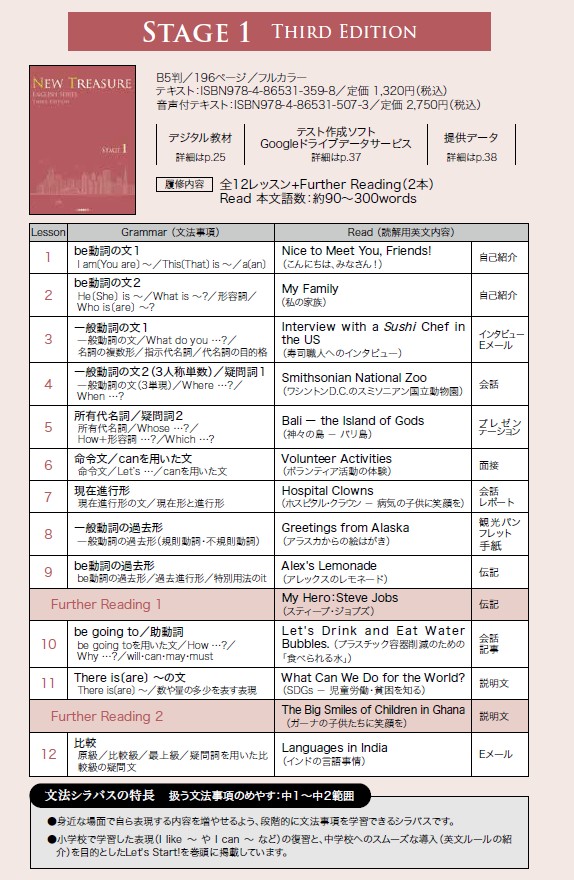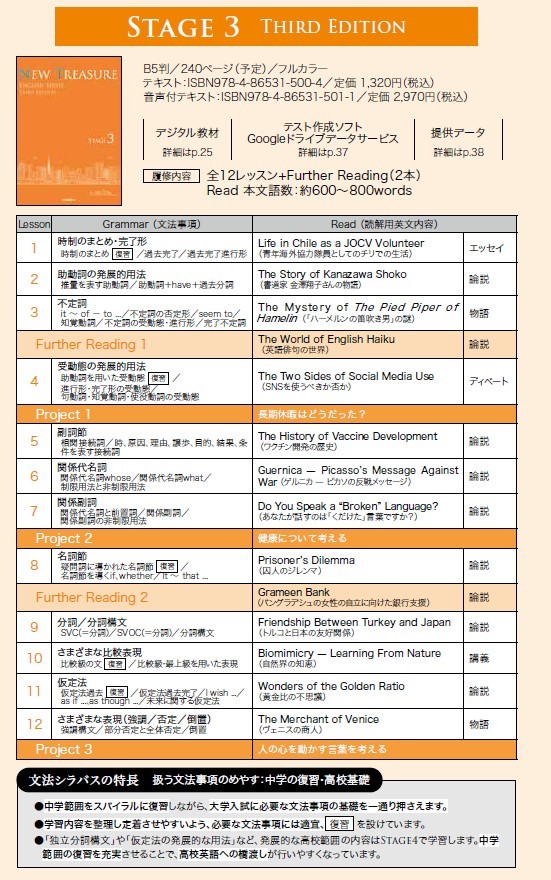New Treasure(2023年カリキュラム、シラバス)
随時追加、編集中
STAGE 1
STAGE 2
Lesson 11(不定詞の発展:it for to、svo to、疑問詞+to、too to、原形不定詞let helpなど)
Lesson 12(間接疑問、付加疑問、仮定法の基礎)
① I know who that man is. 私は あの男の人がだれか 知っています。
② Do you know where she lives ? あなたは彼女がどこに住んでいるか知っていますか。
③ I want to know when he will come. 私は 彼がいつ来るか 知りたい。
④ Please tell me how old you are. あなたが何歳か 私に教えてください。
⑤ I wonder who came here. だれがここへ来たの かしら。
STAGE 3
多くの学校では、中3の秋(9月)からこのテキストに入る。
Lesson 1(過去完了、過去完了進行形、大過去、未来完了)
過去完了
「過去のある時点」に焦点を置いて、その時までの動作・状態をその時点に結びつけて述べる場合、過去完了を用いる。
*過去完了と大過去との違い:現在完了と過去形の違いと同じで、その時点に結びつけているか否か。
★《日本語訳トレーニング》
When I arrived at my sister’s house, she had already gone to work.
My sister had had several part-time jobs before she became a teacher.
She had lived in Nara for three years before she entered university.
I had never been to Nara until we went to visit her.
過去完了進行形
過去のある時点より前に始まり、その時点まで継続していた動作、またはその直前に終わった動作を表す。
*過去完了進行形では,動作動詞(動作を表す動詞)を用い、状態動詞(know,likeなど)は過去完了進行形にしない。
★《日本語訳トレーニング》
We had been waiting at the airport for an hour before the airplane left.
I hadn’t been relaxing on the flight because it was a rough flight.
大過去
あるできごとが別の過去のできごとよりも前に起こったことを表す場合、過去完了を用いる。
*過去完了と大過去との違い:現在完了と過去形の違いと同じで、その時点に結びつけているか否か。
*過去完了を使わない場合afterやbefore などの接続詞が文中で用いられている場合や、文脈から時の前後関係が明らかな場合には、過去完了は使わず、どちらの動詞も過去形にすることが多い。
例 The art gallery bought the work, but didn’t display it.
★時制の一致による過去完了とは
従節の動詞が主節の動詞の時制より前のことを表す場合、主節の動詞が過去形になると、従節の動詞は過去完了になる。
★《日本語訳トレーニング》
At the exhibition, I saw a painting that a famous artist had painted.
The painting was bigger than I had expected.
Many people thought that the painter had won the award.
未来完了
未来のある時点を基準にして、現在からその時点までの動作や状態の’完了・結果、経験、継続’を表すには未来完了を用いる。
*未来完了とともによく使われる”時’や’条件’を表す副詞節の中では,未来のことでも動詞の現在形を使うことにも注意。
★《日本語訳トレーニング》
More than ten thousand visitors will have seen the exhibition by next year.
If I go to the art gallery again next week, I will have seen the painting twice.
Lesson 1 read
Lesson 1 critical thinking
Lesson 3(it of to、不定詞の否定形、不定詞+前置詞、自動詞+不定詞(seem toなど)、使役動詞、知覚動詞、不定詞の受動態、不定詞の進行形、完了不定詞)
it of to
⇒it of toは、of 人のところを主語にして書き換え可能。
⇒it for toは、it と to が対応しているので、to不定詞を主語に書き換え可能。
It is easy for Tom to solve the problem.
⇒To solve the problem is easy for Tom.
It is clever of Tom to solve the problem.
⇒Tom is clever to solve the problem.
good, kind, nice(親切な)
polite(礼儀正しい)
rude(失礼な)
clever, wise(賢明な)
foolish, silly, stupid(愚かな)
careless(不注意な)
selfish(わがままな)
brave(勇敢な)
honest(正直な)
★《日本語訳トレーニング》it of to ~
You were brave to save the drowning child.
It was stupid of you to run at full speed in a marathon.
It is polite of him to take off his hat to greet you.
We don’t need any help, but it is very kind of you to offer.
It is kind of Julia to invite me to dinner.
It was rude of him to ignore you.
How wise it was of you to take notes during his speech!
It was stupid of you to spend that money on such an old bike.
It was silly of me to buy it without even looking at the price.
解答表示
マラソンで全速力で走ったのは愚かだった。
帽子を取って挨拶するのは礼儀正しい。
私たちに助けは必要ありませんが、申し出てくださるのはとても親切です。
私を夕食に招待してくれたのはジュリアの親切だ。
あなたを無視したのは失礼だった。
スピーチ中にメモを取ったのは賢明だ!
あんな古いバイクにお金をかけたのは愚かだった。
値段さえ見ずに買ったのは愚かだった。
不定詞の否定形
I have decided not to waste money.
★副詞的用法の不定詞の否定形
目的を表す場合(~しないように)は、単にnot to~とはせず、明確にしてin order not to~か、so as not to~を使う。
*in order toは文頭に置かれることがあるが、so as toは文頭に置かれることは通例ない。
Meg studied hard in order not to fail the math test.
目的を表す場合でも例外的に、take care not to~やbe careful not to~の形がある。
A bad cold is going around. Take care not to catch it.
★形容詞的用法の不定詞の否定形は、理論上可能。しかし、名詞が否定形になっていることが多い。
I have no time to play with my little sisters now.
I had nothing to give him when I met him yesterday.
★《日本語訳トレーニング》不定詞の否定形
John decided not to believe the bad rumor.
Wear something warm in order not to catch a cold.
Mari ran to the bus stop in order not to miss the bus.
He took a taxi so as not to be late for the meeting.
You must be careful not to break the dishes.
We repeated the words many times so as not to forget them.
形容詞的用法の不定詞+前置詞
①修飾される名詞が、不定詞の意味上の主語になる場合
例 I need someone to help me with these tasks.
⇒someone(主語) help(動詞)の関係
②修飾される名詞が、不定詞の意味上の目的語になる場合
例 She’s looking for a book to read for her essay.
⇒read(動詞) a book(目的語)の関係
③不定詞が名詞の内容を説明する場合
例 I believe in Ken’s ability to win the award in the speech contest.
⇒ability ≒ win the award
④修飾される名詞が、不定詞の前置詞の目的語になっている場合
例 We looked for a bench to sit on.
⇒sit on(動詞) a bench(前置詞の目的語)の関係
★《日本語訳トレーニング》
Would you give me something hot to drink?
We walked along the river and looked for a bench to sit on.
Can you lend me something to write with?
自動詞+不定詞:get to、come to
toのあとには思考・感情を表す状態動詞(believe,know,like, love, think, understandなど)がくる。
*get to と come toの違い:come to のほうが口語的。
★《日本語訳トレーニング》
He got to know the members of the team very well.
Michael came to realize the importance of teamwork.
自動詞+不定詞:seem to~(≒appear to~)
S seem to~
S は~のように見える(主観的意見);~らしい(客観的事実)
*「見える」というのは、主語Sの意見ではなく、話し手の主観的意見や客観的判断を述べる
seem to~
⇒主観的意見&客観的事実
appear to~
⇒客観的事実
S seem to V~
⇒It seems that S V~
Mr. Jones seems to know everyone at the school.
⇒It seems that Mr. Jones knows everyone at the school.
★《日本語訳トレーニング》seem to
You seem to dislike this comedian, but I like him.
The children appear to know the answer to the riddle.
It seems that the problem is beyond my knowledge. / The problem seems to be beyond my knowledge.
Your mother seems to be tired.
The new teacher appears to be very nice.
It appears that the class has begun. / The class appears to have begun.
John is a very smart student. He somehow seems to know how around problems.
使役動詞
使役動詞とは:相手にある動作・状態を起こさせることを表す。
★《日本語訳トレーニング》
Mr. Jones made his sons wash the car.
The book made the students think about the earth.
Please let me know her name.
The cook let the boy taste the soup.
Mary’s father didn’t let her play video games.
I had the waitress bring a glass of water.
My mother had me clean my sister’s room.
I will get her to drive me to the store.
I got my teacher to check my essay.
Nobody (No one) could make him work harder.
Please let me know when you will arrive.
I’ll let you know when I get more information.
知覚動詞
see
watch(じっと見る)
look at
hear
listen to
feel(感じる)
notice(気づく)
知覚動詞+O(目的語)+原形不定詞の形
⇒〜が⋯するのを見る(聞く) *動作の始めから終わりまで見る(聞く)
We saw Jack shut the door behind him.
I saw a dog swim across the river.
知覚動詞+O+現在分詞の形
⇒〜が⋯しているのを見る(聞く) *進行中の動作の最中を見たり(聞く)
I felt the cold wind coming through my sweater.
I saw a dog swimming across the river.
知覚動詞+O+過去分詞の形
⇒〜が⋯されるのを見る(聞く)
I saw Chris scolded by Mr.Brown.
★《日本語訳トレーニング》知覚動詞
I saw my neighbors come out of the restaurant.
Did you see the man arrested?
We saw Tom talking happily with his friends.
I didn’t hear my name called.
I like to hear the music played on the piano.
They heard someone laughing in a loud voice.
Have you ever heard her play the drums? She’s good!
Did you hear someone singing loudly last night?
I listened to you and Mari singing a song.
I listened to my daughter talk about her school life.
The dog didn’t notice the cat steal his food.
I felt something moving around me.
It was a stormy day, I felt the waves hit the boat.
Look at him running in the park.
They watched the sun rising over the hill.
Judy was watching the painter painting (drawing) a picture.
The children watched a lot of cars pass by their house every day.
不定詞の進行形
to be ~ing の形で、不定詞に「~している」の意味を加えることができる。
★《日本語訳トレーニング》
He seems to be jogging in the park.
Mike seems to be concentrating on his report.
He seemed to be jogging in the park.
不定詞の受動態
to be 過去分詞 の形で、不定詞に「~される」の意味を加えることができる。
★《日本語訳トレーニング》
Tom wants to be loved by everyone.
He seems to be respected by his classmates because of his knowledge of animals.
I was very glad to be invited.
There is nothing to be done.
This story is too long to be read in an hour.
完了不定詞(不定詞の過去形)
to have 過去分詞 の形で、文の動詞よりも不定詞の方が前(過去)である【時制のズレ】、というの意味を加えることができる。
パターン①
文の動詞が現在形で、不定詞がそれよりも前(過去形・現在完了)を表す場合
例 I seem to have dropped my smartphone somewhere.
(≒It seems that I dropped (have dropped) my smartphone somewhere.)
パターン②
文の動詞が過去形で、不定詞がそれよりも前(大過去・過去完了)を表す場合
例 The train appeared to have left when Nancy arrived at the station.
(≒It appeared that the train had left when Nancy arrived at the station.)
★《日本語訳トレーニング》
John seems to have solved the problem.
They seemed to have had a good time.
Mr. Smith seems to have come back yesterday.
Bob seems to have made a few mistakes.
Lesson 3 read
ドイツの北部にあるハーメルンの街では、ネズミが大繁殖して困っていた。
そこに、まだら色(Pied)の服を着た笛吹き男(Piper)が現れ、「報酬をくれるならネズミを退治する」と持ち掛ける。
街の人々は男に報酬を約束。
そしてパイドパイパーは、笛を吹いて、街中のネズミを集めた。
そのまま近くの川に歩いていき、ネズミを溺死させました。
ネズミを退治したパイドパイパーだったが、街の人々は約束の報酬を男に払わなかった。
怒ったパイドパイパーは笛を吹いて、街中の子どもたちを集め、そのまま一緒に街を出て子どもたちが二度と帰ってこなかったという話。
European folk stories ヨーロッパの民話
the Pied Piper まだら色の笛吹き(パイドパイパー)
This classic story この古典的な物語
The Brothers Grimm グリム兄弟
fairy tales おとぎ話
Hamelin ハーメルン(ドイツの北部にある都市)
*****
the rats bit the babies ねずみは赤ん坊にかみついた
a man dressed like a clown appeared ピエロのような格好をした男が現れた
clown ピエロ
crown 王冠(トヨタの車のブランド名でもある)
he had a special pipe 彼は特別なパイプを持っていた
flute 笛
drive away 〔虫・誘惑・苦痛などを〕追い払う、撃退する
magic 手品、マジック、呪文、まじない
naturally 自然に、本来、生まれつき、当然、もちろん
any more それ以上、もはや
protest 抗議する
church 教会
*****
a number of 多くの~
die of ~ (直接的な原因)で死ぬ
died from ~ (間接的な原因)で死ぬ
in this version このバージョンでは
a military person 軍人
symbolize 象徴する
emigrate 移住する
in order to get jobs and land 仕事と土地を得るために
Piper symbolizes a person who talked people into emigrating. パイパーは人々を説得して移住させた人物を象徴している。
Were there even any rats in the town? 町にネズミでさえいたのだろうか
Lesson 6(関係代名詞 whose, what, 関係代名詞の非制限用法)
6-1
Reina Sofia レイナ·ソフィア(ソフィア王妃美術館)
Pablo Picasso パブロ・ピカソ
Salvador Dalí サルバドール・ダリ
Atocha station アトーチャ駅
Charges 料金
General Entry 12 euros 一般入場料12ユーロ
18 euros for two visitors 2人の訪問者に18ユーロ
on a weekday 平日に
sculpture 彫刻
for a break 休憩のため
memorable (メモリーしやすい)記憶しやすい、忘れられない、印象的な
6-2
Barcelona バルセロナ
La Sagrada Familia サグラダ・ファミリア
Antoni Gaudi アントニ・ガウディ:建築家
curve 曲線
achievement 功績、実績、成し遂げること
Montjuic ムンジュイック
structure 構造
construction 建設工事
6-3
opposition to~ ~への反対
read
prayer 祈り、祈る人
General Franco フランコ将軍
rule 支配する
Lesson 7(関係副詞)
関係代名詞が前置詞の目的語になる場合の2通りの表し方
I want to visit the house. – Shakespeare was born in it.
=①I want to visit the house which(thatでも可) Shakespeare was born in.
=②I want to visit the house in which(thatは不可) Shakespeare was born.
もし熟語の前置詞の場合、切り離しができないので、②の形ではなく①の形をとる。
I wasn’t able to attend the party (which/that) I had been looking forward to.
★《日本語訳トレーニング》
This is the village which(that) I was born in.
This is the village in which I was born.
The man whom you were talking about will publish a book.
He was surrounded by the people with whom he worked.
関係副詞 where when why how
This is the town. + My father lived in the town.
=This is the town where my father lived.
★関係副詞は前置詞+関係代名詞で書き換えが可能
I’m looking forward to the day when you will visit us.
=I’m looking forward to the day on which you will visit us.
★関係副詞の省略
①whenとwhyは省略できる。
例 There was a time Germany was divided into East and West.
例 Do you know the reason he turned pale at the news?
②whereも先行詞がわかりやすい the placeのときには省略できる。
③逆に先行詞がthe place、the reason、the timeのときには、わかりやすいがゆえに、先行詞を省略して、関係副詞だけ記載する場合もある。
例 That’s (the reason) why I didn’t tell you the truth.
★《日本語訳トレーニング》
I want to move to a country where the climate is tropical.
I’ll never forget the day when I first made a speech in public.
I can’t think of any reasons why I was scolded by my wife.
関係副詞の非制限用法
Lesson 9(分詞・分詞構文)
自動詞+分詞
sit ~ing ~しながら座る
sit ~過去分詞 ~されながら座る
keep ~ing ~し続ける
この分詞は、主語の状況を説明する主格補語のはたらきをしている。2つの動作が同時に行われている意味を表す。
★《日本語訳トレーニング》
After the class was over, we all sat talking for an hour.
The movie star stood surrounded by a lot of reporters.
George kept tapping his fingers on the desk.
SVO+分詞
知覚動詞+O+現在分詞の形 Oが⋯するのを見る(聞く)
知覚動詞+O+過去分詞の形 Oが⋯されるのを見る(聞く)
have O + 過去分詞 Oを~してもらう、Oが~される
get O + 過去分詞 Oを~してもらう、Oが~される
make O + 過去分詞 Oをを~してもらう
keep O + 分詞 Oを~のままにしておく
leave O + 分詞 Oを~の状態にしておく
find O + 分詞 Oが~であると気づく
★《日本語訳トレーニング》
I had a bad tooth pulled out at the dentist’s.
I’d like to get this gift wrapped.
Ron had all his money stolen in London.
Ted spoke slowly and clearly to make himself understood.
Don’t leave the water running.
Andy came home and found all the doors locked.
分詞構文
主節に対して、分詞の句が副詞的な働き(自分で接続詞の意味when,as,andなどを補う必要がある)をする文のこと。
分詞のカタマリの主語は、文の主語と一致する。
そしてその主語に対して、能動の場合は現在分詞、受動の場合は過去分詞を使う。
例 Walking along the street, I came across a man with a big dog.
=When I was walking along the street, ~
*分詞構文では、接続詞と主語とbe動詞が省略されている。
★《日本語訳トレーニング》
Turning on the light, I saw a mouse running under the table.
Located on a quiet street, the hotel offers comfortable rooms.
The train starts at seven, arriving at Tokyo Station at nine.
Traveling all over Europe, I met a lot of charming people.
Asked an unexpected question, I couldn’t come up with the answer.
The monkey was sitting in the tree, eating a banana.
否定の分詞構文
例 Not knowing what to do, I asked Ted for help.
= As I did not know what to do, ~
*否定の分詞構文では、接続詞と主語と否定語が省略されている。
★《日本語訳トレーニング》
Not knowing where to go, I first called at the information center.
Not being able to understand each other’s language, we sat in silence.
完了形の分詞構文
文の動詞よりも、分詞構文の動詞の方が1つ前の時制を表現している文をさす。
Having 過去分詞~の形をとる。
Not having 過去分詞~の形で完了形の分詞構文の否定形になる。
例 Having gotten lost, I stopped at a convenience store to ask directions.
= Because I had gotten lost, ~
*完了形の分詞構文では、接続詞と主語と過去完了(had+pp)が省略されている。
★《日本語訳トレーニング》
Having finished my homework, I’m playing a video game now.
Having quit his job, Mike had plenty of time to study.
Never having tried raw fish, Emily didn’t want to eat sushi.
分詞を使った重要表現
go ~ing ~しに行く
busy ~ing ~するのに忙しい
spend 時間 ~ing ~して時間を過ごす
There is 名詞 ~ing ~している名詞が存在する
付帯状況のwith
with O ~ing Oが~している状態で
with O ~過去分詞 Oが~された状態で
★《日本語訳トレーニング》
I went skating on the lake last weekend.
Ted was busy preparing for the exam.
There are some people waiting outside.
My father spent two hours lying on the sofa.
She watched the jewel with her eyes shining.
Listen to the CD with your eyes closed.
Lesson 11(仮定法)
仮定法過去(現在や未来の起こりそうもない仮定の話)
if 過去形(be動詞の場合は主語に関わらずwere)~、助動詞の過去形(could might would) の形をとる。
過去形を使うが、意味としては現在または未来のことを意味している。
もし~なら、…だろうに。
例 If I were (was) not sick, I would show you around Kyoto.
=I am sick, so I will not show you around Kyoto.
*同意文に書き換えるときは、反実仮想であるがゆえに、逆(否定)のことになる。
★《日本語訳トレーニング》
If I won the lottery, I could buy a house in Hawaii.
If he were alive, he might be delighted at the news. goiremoe
If the engine ran properly, I wouldn’t need to give up the car.
What would you like to do if you were ten years younger?
仮定法過去完了
if 過去完了(had pp)~、助動詞の過去形+have pp… の形をとる。
もし~だったなら、…だっただろうに。
例 If you had called me, I would have picked you up at the airport.
=You didn’t call me, so I didn’t pick you up at the airport.
例 If I had been born in America, I would be able to speak English much better now.
★《日本語訳トレーニング》
If Mike had done his best, he could have won the game.
If you had called me, I would have picked you up at the airport.
If the baby’s mother hadn’t come, the baby might have cried.
If I had had time, I wouldn’t have declined your offer.
If you hadn’t helped us, we couldn’t have passed the exam.
仮定法を用いた重要表現 I wish~、as if(though)~
I wish 主語 過去形~ ~であればいいのに。
I wish 主語 had pp~ ~だったらよかったのに。
★as if(though)~
as if(though) 主語 過去形~ まるで~であるかのように
as if(though) 主語 had pp~ まるで~であったかのように
★《日本語訳トレーニング》
I’m so tired! I wish I were at home and asleep in a soft bed.
The route to his office is so Complicated. I wish I had brought a map.
Mary’s brother behaves as if he were a movie star.
John is my best friend, but sometimes we quarrel as though we were enemies.
Natalie talked as if she knew everything.
Ron looked feally scared. He looked as if he had seen a ghost.
-120x120.jpg)
.jpg)


